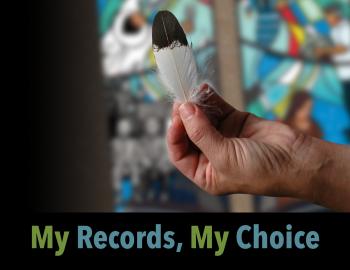Summary
Windspeaker.com Contributor
Indian residential school survivors who participated in the Independent Assessment Process or its predecessor Alternative Dispute Resolution process must notify the Indian Residential Schools Adjudication Secretariat within the next eight years if they want their records kept. If IRSAS receives no notification, those records will be destroyed.
Kathleen Keating, an adjudicator with the IRSAS, is reassured that the default setting will see records destroyed and privacy protected. Keating presided over more than 500 IAP and ADR hearings and says all the people who spoke to her would want their records destroyed.
“There may be people who changed their minds since the hearing, but honestly that was the primary concern. People came into those hearings, some of them sick to the point of vomiting, and I mean that literally, at the thought that their story might get out in their community or even to their family,” said Keating. “I just can’t emphasize enough how great a concern that was for claimants.”
What would happen with the records – the claimant’s application form, transcript of testimony, voice recording of testimony, and decision on the claim – was the subject of three court proceedings, the final one at the Supreme Court of Canada.
The IAP and ADR provided a second level of compensation to former residential school students who were victims of sexual abuse, serious physical abuse, or who suffered serious psychological consequences as a result of the abuse. The Truth and Reconciliation Commission and the federal government wanted the documents from those proceedings archived, with the federal government claiming the documents were federal property. The court ruled the documents were court property. Initially the IRSAS said the documents should be destroyed, but then said the documents should be controlled by the claimants.
In the end, the Supreme Court upheld the trial court’s ruling that the documents be destroyed, unless claimants chose to have their own accounts archived.
The IRSAS, tasked with ensuring that claimants know they have until Sept. 19, 2027, to make their decision, have now begun that work.
Those who choose to archive their records will have them held at the National Centre for Truth and Reconciliation, in Winnipeg. The NTRC was created by the Indian Residential Schools Settlement Agreement, which also brought about the IAP, to preserve the history and legacy of the residential schools.
Those records will be made available to the public through restricted access, which means personal information will be removed, or through open access, which will include all personal information. The claimant will choose the scope of access. The claimant may also, at a later date, choose to remove their records from the NTRC and have them destroyed.
Some people may decide, says Keating, that there is a public benefit to having their stories shared, with or without the identifying factors.
I do see a benefit in having the Canadian public generally more aware of the residential school experience, but that was the function of the Truth and Reconciliation Commission, she said, “The purpose of the IAP was not one of public education.”
There are over 43,000 sets of records being held right now by the IRSAS, with 128 hearings still in progress. The remaining claims are expected to be resolved by 2020.
Keating is confident that the vast majority of those claimants will be notified of their options. She does point out that some are deceased. Their records will be destroyed as only the claimants have the right to decide if their records will be archived.
“I don’t suppose there’s any program that can reach 100 per cent of those people… but I think we have the best chance as possible of reaching as many of these people as any program could…. It’s got many, many facets,” she said.
Hilsoft Notifications has been hired to carry out the notification plan. Along with a website, Native friendship centres and organizations that work with Indigenous peoples have been approached; there is a social media presence; television and print media are running advertisements; and there are posters and postcards to be distributed. People are also being trained in communities to help claimants.
Claimants may request their transcripts before they make the decision on whether to archive their records or destroy them. Keating said that at some of her hearings, claimants requested their transcripts to burn them in ceremony. Others requested their transcripts in case they decided later to share their story with their children. All claimants then and now have a right to their transcripts and other records, stressed Keating.
If you know someone who made an IAP or ADR claim for residential school abuse, pass along this information. Claimants may choose to get a copy of their records, preserve them for history at the National Centre for Truth and Reconciliation, or have the records destroyed.
For information: 1-877-635-2648 (toll free) or www.MyRecordsMyChoice.ca

